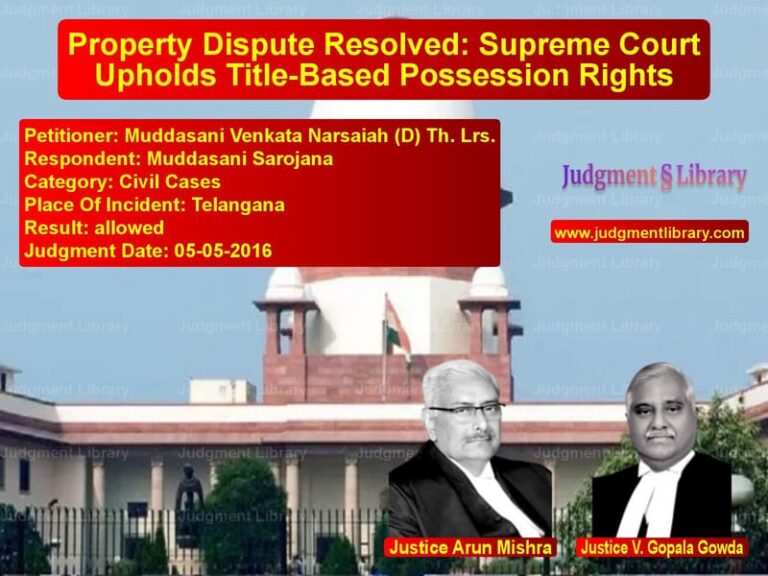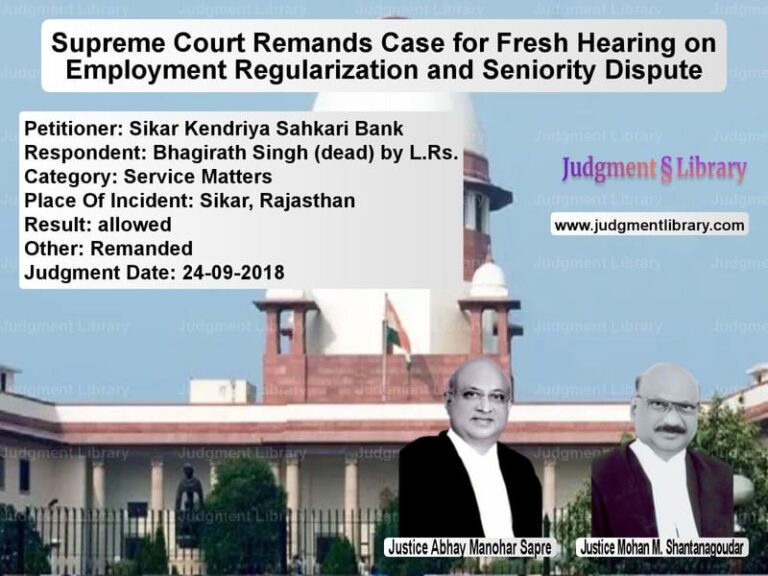Reassessment Notices and Tax Reforms: Legal Review of Amendments in the Income Tax Act
This case addresses the legal challenges faced by the Union of India against several decisions by different High Courts concerning reassessment notices issued under Section 148 of the Income Tax Act, 1961. The petitioners, including Ashish Agarwal, contested the validity of these notices after the Finance Act, 2021, introduced amendments to the Income Tax Act, which impacted the reassessment process. The matter was escalated to the Supreme Court, which reviewed the decisions of the High Courts and provided a resolution in the interest of expeditious tax administration.
The case primarily deals with the issue of reassessment notices issued after April 1, 2021, under the old provisions of Section 148, despite the amendments. The petitioners argued that these notices were invalid due to the changes brought in by the Finance Act, 2021, which introduced new procedures under Sections 147 to 151 of the Income Tax Act, including the introduction of Section 148A, which requires prior approval from the specified authority before initiating reassessment proceedings.
Petitioner’s Arguments
The petitioners, representing the taxpayers challenging the reassessment notices, argued that the notices issued after April 1, 2021, under the pre-amended provisions were legally flawed. They contended that the amendments to the Income Tax Act, particularly the introduction of Section 148A, were intended to streamline the reassessment process and provide additional safeguards to the taxpayers. These amendments made it mandatory for the Assessing Officer to conduct inquiries before issuing a notice under Section 148, which the petitioners claimed was not followed in the issuance of the challenged notices.
Additionally, the petitioners raised concerns over the procedural safeguards in place prior to the Finance Act, 2021, which allowed reassessments without adequate inquiry or approval. They contended that the reassessment notices issued under the unamended provisions were based on a change of opinion rather than on reliable information, and thus violated the legal principles laid down by the Court in GKN Driveshafts (India) Ltd. v. Income Tax Officer. The petitioners also highlighted that the Revenue’s issuance of a large number of such notices post-1st April 2021 was a result of a misunderstanding or non-application of the amendments, which, they argued, should have governed all reassessment proceedings.
Respondent’s Arguments
The Union of India, represented by the Attorney General, argued in defense of the reassessment notices issued by the Revenue. The Attorney General explained that the amendments to the Income Tax Act, which came into effect on April 1, 2021, were designed to improve the efficiency and transparency of the reassessment process. However, he acknowledged that the reassessment notices had been issued under the old provisions by mistake, as there was a misunderstanding regarding the applicability of the new amendments.
The Attorney General further contended that the Revenue had taken necessary steps to comply with the new procedures under Section 148A, which required prior approval from the specified authority before initiating reassessment proceedings. The Union also argued that the petitioners’ claims regarding the constitutional validity of the reassessment process were without merit, as the amendments to the Income Tax Act were procedural in nature and did not infringe upon the taxpayers’ rights.
Court’s Analysis and Conclusion
The Supreme Court reviewed the legal arguments presented by both sides and considered the context of the Finance Act, 2021, which introduced significant amendments to the Income Tax Act, particularly with respect to reassessment proceedings. The Court noted that the amendments were designed to streamline the reassessment process and ensure that taxpayers had more safeguards in place before their assessments were reopened.
Read also: https://judgmentlibrary.com/gst-refund-delays-supreme-court-lowers-interest-rate-on-late-payments/
The Court also acknowledged the concerns raised by the petitioners regarding the failure of the Revenue to apply the new procedures correctly and the resulting confusion. The Court emphasized that while the new provisions should have been applied to all reassessment notices issued after April 1, 2021, it was apparent that the Revenue’s officers had acted under a mistaken belief regarding the applicability of the new rules. However, the Court also recognized that the Revenue’s failure to apply the amendments did not invalidate the reassessment notices outright.
In light of the above, the Supreme Court ruled that the reassessment notices issued under the pre-amended provisions of Section 148 would be deemed to have been issued under Section 148A of the Income Tax Act, as amended by the Finance Act, 2021. The Court directed that the Assessing Officers would be required to provide the taxpayers with the material relied upon for the reassessment and allow them to respond to the show-cause notices. The Court also dispensed with the requirement for conducting any further inquiry before issuing the notices, in a one-time measure, given the circumstances of the case.
Final Decision
The Supreme Court concluded that the reassessment notices issued under Section 148, prior to the amendments, would be treated as notices under Section 148A of the amended Income Tax Act. The Court directed that the necessary procedural steps be followed for each of the concerned assessees, including providing them with an opportunity to respond to the notices. The Court also modified the judgments of the respective High Courts, which had set aside the reassessment notices, and directed the Revenue to proceed with the reassessment process under the newly amended provisions of the Income Tax Act. The petition was partly allowed, and the matter was remanded for compliance with the Court’s directions.
Petitioner Name: Ashish Agarwal.Respondent Name: Union of India & Ors..Judgment By: Justice M. R. Shah, Justice B.V. Nagarathna.Place Of Incident: India.Judgment Date: 04-05-2022.
Don’t miss out on the full details! Download the complete judgment in PDF format below and gain valuable insights instantly!
Download Judgment: ashish-agarwal-vs-union-of-india-&-ors-supreme-court-of-india-judgment-dated-04-05-2022.pdf
Directly Download Judgment: Directly download this Judgment
See all petitions in Income Tax Disputes
See all petitions in Tax Refund Disputes
See all petitions in Tax Evasion Cases
See all petitions in Judgment by Mukeshkumar Rasikbhai Shah
See all petitions in Judgment by B.V. Nagarathna
See all petitions in partially allowed
See all petitions in supreme court of India judgments May 2022
See all petitions in 2022 judgments
See all posts in Taxation and Financial Cases Category
See all allowed petitions in Taxation and Financial Cases Category
See all Dismissed petitions in Taxation and Financial Cases Category
See all partially allowed petitions in Taxation and Financial Cases Category







